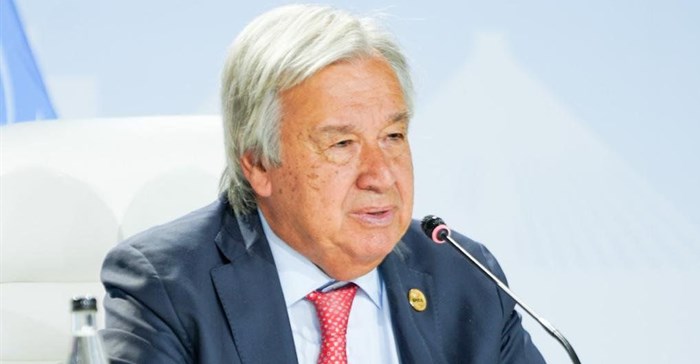António Guterres, the ninth Secretary-General of the United Nations, has been advocating for African representation on the UN Security Council.

Source: United Nations. UN Secretary-General, António Guterres.
"We're not there yet, but we're moving in that direction. I believe that all permament members of the UN Security Council should see Africa represented and that these discrepancies should be addressed next year," he said.
Guterres was speaking on the final day of the Brics2023 Summit in Johannesburg where he was speaking of the urgent need to restore trust and reinvigorate multilateralism for the 21st century.
He spotlighted Africa, saying it is imperative that it receive utmost consideration.
"Just as it lacks a permanent seat on the Security Council, Africa is underrepresented in the global financial architecture, The world has changed. Global governance must change with it.
"A historic victim of slavery and colonialism, Africa continues to confront grave injustices. On average, African countries pay four times more for borrowing than the United States and eight times more than the wealthiest European countries," he said,
Moreover, Africa accounts for just 4% of global emissions, but is an epicentre of climate chaos, he added.
For action and justice in this regard, Guterres stressed that two priorities must be addressed. On the economic front he advocated for the reform of "outdated, dysfunctional and unfair global financial architecture" and the implementation of the Sustainable Development Goal (SDG) Stimulus - a debt workout mechanism as the means to realise sustainable development in Africa.
Advancing climate initiatives
More recently he introduced a Climate Solidarity Fund which mandates developed countries to provide emerging economies in Africa with financial and technical support. This, with the aim to promote an equitable and just transition to renewable energy.
To further boost these efforts, he introduced an Acceleration Agenda wherein which developed countries are obligated to reach net-zero emissions as close as possible to 2040, and developing countries as close as possible to 2050.
He said developed countries must finally keep their promises to developing countries by providing them with $100bn a year in climate financing, doubling their adaptation finance, replenishing the Green Climate Fund, and operationalising the loss and damage fund this year.
On a broader scale, he spoke too of the need for the reformation of the Bretton Woods system - an international monetary system established after World War II, during a conference held in Bretton Woods, New Hampshire, United States, in July 1944.
The primary goal of this system was to create a stable and predictable international monetary order to promote economic stability and prevent the competitive devaluations and trade restrictions that had contributed to the Great Depression and global economic instability during the 1930s.
"The system has become too small; it needs to grow and we have an opportunity to make it universal. Its capital structure must reflect the realities of this world. If we don't leverage this, parallel systems will emerge and there will be a fragmentation of financial structures.
"We need reforms to make global frameworks truly universal and representative of today's world. As a matter of justice, Africa must be considered a priority in all these efforts."




























